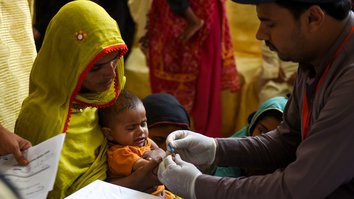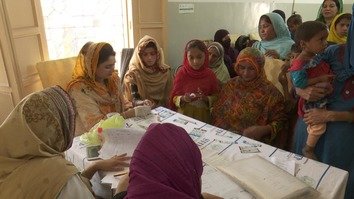PESHAWAR -- Khyber Pakhtunkhwa (KP) authorities are cracking down on clinics and medical facilities run by quacks and unqualified medical professionals.
A three-member bench of the Supreme Court presided over by Chief Justice Mian Saqib Nisar ordered the crackdown on April 20, instructing the KP Health Care Commission (KPHCC) to shut down illegal clinics.
KPHCC Chief Executive Officer Azar Sardar told the court at the time that there were about 15,000 clinics throughout the province being run by unauthorised medical practitioners.
"We have launched a broad-based campaign against quackery and illegal clinics, but our efforts seem unnoticeable because of the magnitude of the task assigned to us," KPHCC Director of Operations Arsalan Ahmad Khan told Pakistan Forward in June.
Quackery includes not only practitioners with forged credentials treating patients but also doctors who work beyond their qualifications and expertise, he said, adding that the crackdown requires support from civil society.
A qualified doctor or general practitioner is considered a fraud if he or she is performing tasks outside his/her specialisation [like a dermatologist conducting ultrasounds], Khan said.
Punishment for quackery ranges from a fine of Rs. 5,000-10,000 ($43-86) to Rs. 1 million ($8,600) and six months' imprisonment at the highest level of offence -- cases that involve loss of life or limb, he said.
Over 1,100 quack clinics closed
Since the Supreme Court directive, the KPHCC sealed 929 clinics and laboratories across the province, The News International reported May 30, citing Sardar.
Over the course of three days in June, KP authorities shut down as many as 250 clinics, according to Khan, including a surgical centre that was run by qualified medical professionals but lacked the intensive care unit and blood bank required for surgery.
KP has been divided into four zones: Peshawar and Charsadda (Zone I), Hazara Division (Zone II), Nowshera, Mardan and Swabi (Zone III), and the Southern Zone (Zone IV). An inspector is assigned to supervise the campaign against fraudulent medical professionals in each respective area, he said.
"Teams of district administrators and members of the Health Care Commission are working in collaboration to ensure swiftness and efficiency to achieve the target given by the chief justice of Pakistan," Sajid Khan, a spokesman for Peshawar's Deputy Commissioner Office, told Pakistan Forward.
"Peshawar has been divided into three parts, and a separate team has been assigned to work in areas falling under the jurisdiction of the Peshawar Development Authority," he said.
A total of 104 clinics in various areas of Peshawar have been shut down by the teams, Khan said.
Raids are being led by assistant commissioners or additional assistant commissioners to ensure indiscriminate action against unauthorised medical professionals who are endangering the lives of innocent patients, he said.
Ensuring better health care
"Quacks flourish in the peripheries and remote areas, where residents lack knowledge to allow them to distinguish doctors from quacks," Idrees Mir, owner of a medical supply business in Peshawar, told Pakistan Forward.
"The government's decision to launch the campaign will raise awareness among the public regarding quacks who are deceiving the public with dubious medical advice, leading to potential health complications," he said.
Stopping unqualified practitioners from working will ensure better health care for the public, said Mehmood Khan of Peshawar, a retired computer operator at Pakistan Railways.
"It will also help control the spread of viral diseases, such as hepatitis, which mainly come from unhygienic conditions and from the use of contaminated instruments by quacks," he told Pakistan Forward.
"Authorities must provide better and affordable healthcare facilities in far flung areas where residents are forced to see these unqualified medical practitioners in emergencies," he said.

![Shangla District Assistant Commissioner Tariq Mehmood checks the documents of a medical clinic in April. [Muhammad Shakil]](/cnmi_pf/images/2018/06/12/12991-picrure5-585_329.jpg)







Contact number of inspector or incharge south zone of kpk
Reply2 Comment(s)
These people who provide 50 to 70% services at government hospitals and health facilities are considered nonqualified and quack by the Government they are barred from providing services out of hospitals. It is a strange claim of the Government that if these people work for Government they are considered qualified if they work out of hospital they are considered quack. What else it is If not hypocrisy of the government? Other than that government has no capabilities to provide health facilities at door step of all the people all over the country. In big cities big hospitals conditions are such that for an OPD slip people have to wait in queue for 2/3 hours, just imagine what will be the conditions of small cities and villages? Brother, first of all make yourself this much capable that you could provide health facilities to your public at every nook and corner of the country then you close down these qualified quack
Reply2 Comment(s)